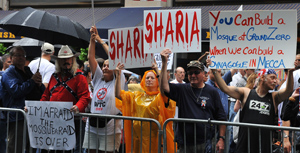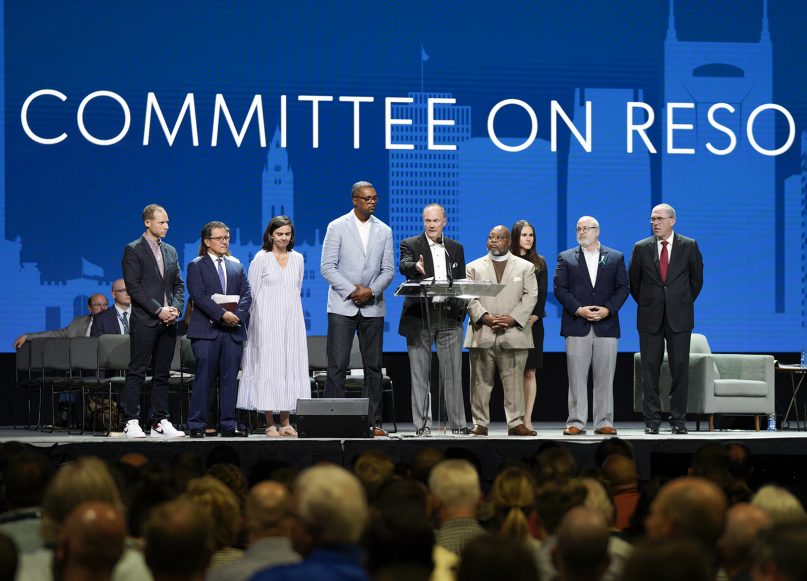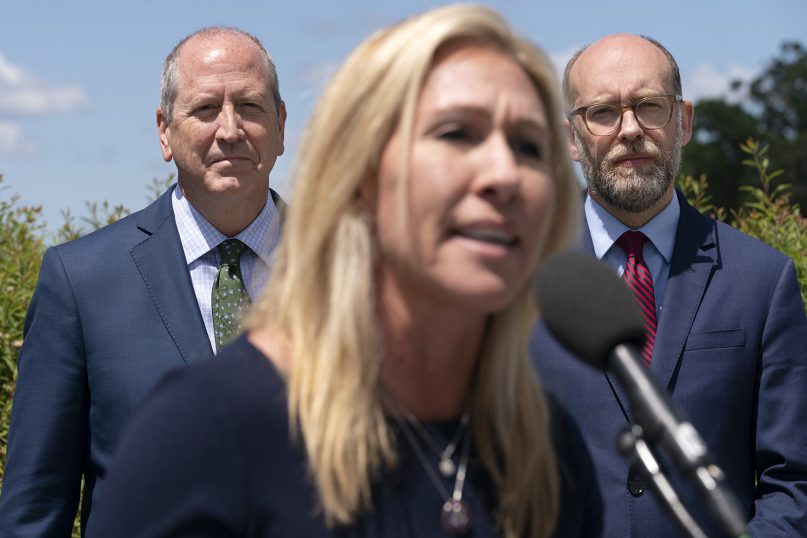(RNS) — Russ Vought believes in fighting racism — as long as it is defined properly.
A former Trump administration official and Wheaton College graduate, Vought defines racism as “personal prejudice that flows from ignorance and treating people differently as a result of that prejudice.”
By contrast, he said, proponents of critical race theory see racism as a systemic problem — not an individual one — that has infected every part of society. That’s led Vought, president of the Center for Renewing America, to become a behind-the-scenes leader in the battle over CRT being fought in churches and school boards around the country,
In an interview with Religion News Service, Vought said his organization does not object to discussions of racism or discrimination. But CRT advocates go too far.
“They don’t want equality of opportunity, they want equality of outcomes,” he said. “That is problematic because then you have no ability to ever live in a colorblind society. And it’s the rejection of a colorblind society that we find so problematic.”
RELATED: Debates over sex abuse, critical race theory are front and center at SBC meeting
The debate over critical race theory, an academic field of study dedicated to understanding the effects of systemic racism, has led to fisticuffs and angry debates at local school boards around the country, with claims that schools are teaching dangerous and divisive ideology that creates racial animosity.
Vought became involved in anti-CRT efforts during the Trump administration. While he was director of the Office of Management and Budget, part of his role was to implement the president’s executive order banning funding for CRT and other diversity training.
“The days of taxpayer funded indoctrination trainings that sow division and racism are over,” Vought tweeted in September 2020.
The days of taxpayer funded indoctrination trainings that sow division and racism are over. Under the direction of @POTUS we are directing agencies to halt critical race theory trainings immediately.https://t.co/dyMeJka9rt
— Russ Vought (@RussVought45) September 4, 2020
Now, Vought’s nonprofit, which seeks to “renew an American consensus of a nation under God,” has published a toolkit for combating critical race theory. The toolkit includes tips for identifying CRT, for growing a grassroots network and for “winning back your school board.” The toolkit describes CRT as a form of identity politics, aimed at destroying any institution deemed to be oppressive — including Christianity, free markets and traditional marriage — and painting “straight white people” as oppressors.
Once people see CRT for what it really is, the guide claims, they will rebel against it.
Heritage Action for America, which promotes “traditional American values,” has also created a toolkit with tips on how to oppose CRT.
Vought said his organization has mostly been involved in efforts at the local school board level but has consulted with state legislators about anti-CRT bills. He is also concerned teaching about CRT has made its way into churches.
People in the pews want unity, he said, and reject any form of racism. But that is not good enough for what he called “woke” celebrity pastors.
“Many of the most senior, well-known, celebrity pastors have been beating down people with a woke theology, and almost bullying people from the pulpit,” he said. “That’s why there is such a reaction to it — because many of those pastors have been misusing the pulpit for the last 10 years.”
Writer, speaker and Daily Beast columnist Wajahat Ali sees parallels between the anti-CRT movement and the anti-Shariah movement prevalent in conservative circles. That movement painted Muslims as threats to America’s Judeo-Christian values and way of life, claiming Muslims and liberals were attempting to impose Islamic law in American schools and communities.
RELATED: In Tennessee mosque fight, religious freedom trumps Islamophobia
The anti-Shariah movement, which rose to national prominence about a decade ago, focused on local politics, especially on zoning boards and community meetings where anti-Shariah activists showed up in force to oppose the construction of new mosques or alleged signs of Shariah in schoolbooks. Several states passed laws, written by anti-Shariah organizations, designed to ban Shariah or other foreign laws from U.S. courts. Presidential candidates and pastors warned of the threat of an Islamic “cultural Jihad” as the greatest threat to the American way of life.

Anti-Shariah demonstrators rally against a proposed mosque near Ground Zero in New York. RNS photo courtesy of Asterio Tecson
In a recent Daily Beast column, Ali argued that anti-CRT activists are drawing from the same playbook as the anti-Shariah movement. He repeated the same concerns in an interview with Religion News Service.
Both movements have taken a concept few Americans understand and turned it into a boogeyman, he said. And both groups have found a news hook to rally people to their cause. For anti-Shariah activists, it was the so-called Ground Zero Mosque, a proposed Muslim community center near the fallen World Trade Center buildings in New York City, and a “mega-mosque” near Nashville, Tennessee. For anti-CRT activists, it’s the 1619 Project from The New York Times, which retold America’s founding from the date slaves first arrived in the American Colonies.
Both groups have also appealed to Christians and church groups for support, said Ali, and they focus on local action by individuals and small groups. That bottom-up strategy has proved effective in the past.
“They have empowered you to become a fisherman and you can go fish for CRT,” he said.
Now, the two are even beginning to merge in some circles.
Act for America, a Virginia-based anti-Islam group, recently started a “1776 Strong” program to combat CRT and what the group’s leader calls attempts to cancel “American patriotic culture.” The group provides graphics for local groups to use on signs and social media posts as well as tips on how to organize local 1776 Strong groups.
“We oppose the hateful 1619 project, Critical Race Theory and protest civics, we reject race and identity politics, the divisive tools deployed by the left to tear our country apart,” Act for America President Brigitte Gabriel said in a Facebook video posted in June that promoted 1776 Strong.

James Merritt, chair of the Southern Baptist Committee on Resolutions and pastor of Cross Pointe Church in Duluth, Georgia, addresses Resolution 2 on the sufficiency of Scripture for race and racial reconciliation June 15, 2021, during the Southern Baptist Convention annual meeting. Photo by Adam Covington/Baptist Press
Carol Swain, a retired Vanderbilt University professor and one-time candidate for mayor of Nashville who has apologized for past comments labeling Islam as a threat to America, has now become an anti-CRT proponent.
Swain recently attended the Southern Baptist Convention’s 2021 annual meeting, where she hoped to speak about the dangers of CRT — debates over which had dominated the weeks building up to the meeting in Nashville.
Swain said the SBC needs to focus on Christian forgiveness to combat racism, rather than CRT. Swain declined a request for an interview but sent a copy of a chapter of her upcoming book that describes CRT as incompatible with Christianity.
Swain also wonders how many apologies from Southern Baptist leaders on the topic of racism will be enough. The denomination was founded by churches that supported slavery, and Southern Baptists defended Jim Crow laws. The SBC apologized for its racist past in 1995, rejected the Confederate battle flag in 2016 and passed a resolution on the Bible and racial reconciliation in 2021.
“I do think the manner in which the SBC was formed holds the organization captive on the race issue,” she said in an email. “I have lost count of the number of apologies and resolutions that the organization has offered since its founding. It is time for its leaders to accept the forgiveness that Christ offers and move forward.”
Swain has been vocal about her criticism of CRT on social media.
“We are living in an Orwellian world where the Left is attempting to erase and recreate America,” she tweeted recently. “Don’t let them!”
Ali worries any discussion about race or racial justice will now become labeled as CRT and any policies for addressing racial inequities will be rejected because of that label. And he doesn’t see the anti-CRT movement fading away soon.
“It’s going to be successful,” he said. “I feel like we are behind the eight ball.”






